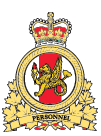VIEWS AND OPINIONS
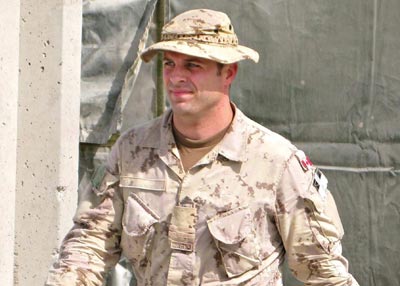
The Canadian Press 9104235 photo by Bill Graveland.
Captain Robert Semrau leaves a military courtroom at Kandahar airfield, Afghanistan, 26 June 2010.
Was Former Captain Robert Semrau Solely Responsible, from an Ethical Point of View, for Killing an Injured Man?
by Rémi Landry
Commentary on an article by Lieutenant Colonel (ret'd) Peter Bradley, PhD, "Is Battlefield Mercy Killing Morally Justifiable?" Canadian Military Journal, Vol. 11, No. 1, (Winter 2010)1
For more information on accessing this file, please visit our help page.
Introduction
The purpose of this opinion piece is to build upon an article about mercy killing on the battlefield, published in winter 2010 by an author who has been my friend for thirty years.
First of all, I want to emphasize that Professor Bradley’s arguments are clear and accurate. I see in them the mark of an accomplished researcher, who, over the years, has refined his thinking on military ethics - a subject that, in the Canadian context, is prominent in the day-to-day practice of the profession of arms.
I will introduce two new perspectives that I believe should have been included in a complete assessment of the ethical importance of the act committed by Captain Robert Semrau in October 2008. Firstly, it must be noted that Professor Bradley’s thinking is consistent with Canadian military ethical principles governing the decision-making process, as set out in official publications.2 But it appears to me that an assumption has been made that those principles can be applied universally, regardless of the cultural environment and the operational context in which our troops are required to work. That might lead one to think that, whatever the situation, it is always possible to make a decision that conforms perfectly to the Canadian military’s Code of Conduct.3 Could it be that the situation facing Captain Semrau was a typical case of the harm dilemma,4 which recognizes that all possible solutions will cause harm or injury?
Secondly, Professor Bradley’s analysis deals only with the individual soldier’s accountability, and assumes that the military institution and Captain Semrau’s immediate superiors are above reproach, and are in no way responsible for his actions. Clearly, it was Captain Semrau who consciously and deliberately committed the act in question, but it is the military institution that selected him and supervised him throughout his preparation and his assignment in Afghanistan. Even if no error committed by Captain Semrau can be attributed to any shortcoming on the part of the chain of command, might its representatives have an ethical responsibility for the act committed, or are they blameless?
I will support Professor Bradley’s position by presenting the effects that an analysis of these perspectives might have upon his ethical assessment of the case in question. Bear in mind that herein, we are examining a hypothetical case whose resemblance to Captain Semrau’s will be limited to the circumstances and environment described by Professor Bradley, in addition to some known facts. I will end the analysis with a brief conclusion.
Are Canadian Ethics too Strict?5
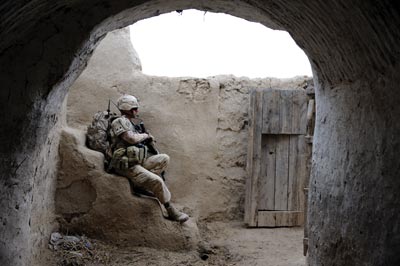
DND photo IS2011-2002-05 by Master Corporal Angela Abbey.
A soldier provides local security in Nakhonay where clearance patrols searched for caches of weapons and IED-making supplies
More than ever, we must integrate the operational context into the decision-making environment of military personnel in order to relativize their ethical conduct.6 Professor Bradley bases his analysis upon the Canadian context, which implies that the Canadian rules for ethical conduct are to be applied rigorously, no matter in what environment or structures Canadian Forces (CF) members are working. But what happens when a CF member must operate outside the Canadian context and adopt the customs and practices of a foreign culture in order to integrate into that culture to ensure the success of an operation, setting aside his or her own convictions? And what happens if those foreign mores and cultural practices are inconsistent with our own, and are incompatible with the CF Code of Conduct and Canadian ethical principles?7 What must the soldier do: disobey a legitimate order from a Canadian superior, which has been approved by the Canadian authorities, and refuse to serve in an arbitrary and possibly unethical context? Or must he or she adapt to that context, by recognizing the legality of the operation and acknowledging that certain unethical acts must be committed, against the soldier’s will, with the aim of contributing to putting an end to an injustice that is even greater than that resulting from the unethical conduct committed?
I believe it is clear that, in such circumstances, members of military forces regularly face dilemmas in which their actions could have positive or negative consequences, and that they must then rely upon the doctrine of double effect.8 That doctrine makes it possible to determine whether the decision made will result in as much good as it will harm, or in more good than harm, and therefore be ethically acceptable. Despite the rigour of this doctrine, we must recognize the difficulty of accurately assessing the true importance and consequences of the actions to be carried out. In addition, there is no guarantee that the moral assessment underlying the decision-making process will be the same for everyone. Considering the brief time available, the complexity of the decision-making process that must be undertaken, and the importance of the consequences of the action to be carried out under such circumstances, the soldier is subjected to such a high level of stress that only experience will enable him or her to manage a given situation well, and to react promptly. Unlike his or her superiors, the soldier has no direct support for making the decision, other than instinct and experience.
There are many historical and contemporary examples that illustrate my point: the Canadians who, during the Second World War, were parachuted in to join the French Resistance, and the human cost of the sabotage to which they contributed; and, more recently, snipers in Afghanistan who had to locate and deliberately eliminate human targets; the CF-18 pilots who bombed strategic targets in Libya without being absolutely certain that no civilian lives would be lost; and, lastly, combat operations carried out at various times in inhabited areas.
Let us briefly recap what we know about Captain Semrau’s situation. At the time, he was a junior officer carrying out the tasks involved in mentoring an Afghan unit. His primary responsibilities during Afghan combat missions were to accompany the Afghan troops and to advise them on the various protocols to be followed, to serve as a contact point with the local ISAF authorities, and, as the highest-ranking Canadian, to command the members of his mentoring team. The reprehensible act in question occurred several months after Captain Semrau’s arrival in theatre.9 In accordance with the international conventions that apply to his case, the primary responsibility for administering first aid to and arranging medical evacuation for all injured persons falls to the Afghan commander, and, to a lesser degree, to all the combatants present, both Afghan and Canadian.
Given the passive, indifferent attitude of the Afghan troops, and even that of the Canadians toward the injured Taliban fighter, as described by the members of the mentoring team, one can assume that a similar situation might have occurred during previous operations, and that seriously injured Taliban members had been abandoned without receiving the care they needed. Such an act is against the law and completely contrary to Canadian rules of conduct.10 I can only assume that, in keeping with those rules of conduct, such illegal actions were reported to the Afghan and the Canadian authorities, but that that type of behaviour did not disappear. That might explain why Captain Semrau, who had an exemplary service record,11 including a previous period of duty in Afghanistan with the British forces, decided to act as he did. Indeed, confronted with the harm dilemma, and in keeping with the doctrine of double effect, he may have chosen to put an end to the Taliban fighter’s suffering, thereby prioritizing a respect for human dignity.12
I must re-emphasize that I did not follow Captain Semrau’s trial, and that the situation I am describing here is a hypothesis for the purposes of illustrating my argument. If we assume that Captain Semrau had only two options,13 namely, to abandon a Taliban fighter dying of wounds to the abdomen and legs inflicted by a 30-mm cannon shell,14 or to kill the man in order to end his suffering, the act of killing a wounded man appears in a different light - which does not, however, absolve the captain of individual responsibility. Personally, if I were in the same situation, I would consider it humane to end the wounded man’s life as quickly as possible, even if the act was extremely traumatic. Is it better to leave the wounded, dying man without administering any care to him, because the mission must continue, and to abandon him to his fate while hoping for a miracle? In that situation, which solution is more wrong: to do nothing, or to hasten the dying man’s death? Both are equally criminal, but one appears to be more humane. Indeed, under international conventions, we are obliged to assist an injured person, whatever that person’s affiliation. Therefore, to leave the scene without doing anything is to violate that imperative, and it would, I believe, constitute just as serious a wrong as taking the person’s life.
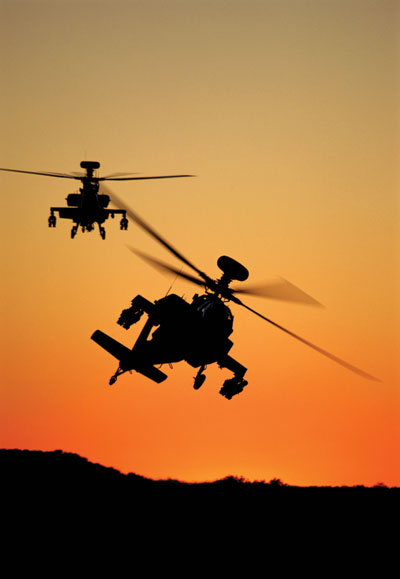
Boeing photo copyright.
An AH-64 Apache Longbow attack helicopter.
If we limit ourselves to the two above-mentioned options, we can say that Captain Semrau contributed directly to an execution, no matter which decision he made. That being said, deciding to do nothing is a choice for which he is responsible, as, to a lesser degree, are the other members of his team, while he alone is responsible for the act of ending the life of the injured man. And what about the responsibility of the Afghan officer, whose conduct was undoubtedly the primary cause of the illegal act?
An illustrative parallel to this situation can be found in the film Sophie’s Choice, in which the heroine, played by Meryl Streep, is forced to decide which of her two children will survive, and which will be sent to a death camp. Throughout the film, she reproaches herself for the choice she made, when, in reality, she was the victim in the situation - the guilty party was the Nazi officer who forced her to make an unethical choice. In addition, although I do not want to enter into a debate on assisted suicide, which is presently the subject of a commission of inquiry in Quebec,15 I must say that I also see points in common with the moral issues raised by the legalization or prohibition of assisted suicide for individuals with incurable, debilitating diseases.
This case also reminds me of some situations I witnessed in central Bosnia during the spring of 1993, when I was detached to the European Union Monitoring Mission (EUMM). We were asked to work on an investigation into the existence of a prostitution ring. The investigation revealed that Croatian women living in a Muslim-majority enclave that was under a food embargo imposed by the Croatian troops (some of whom were the husbands of these women), were forced to prostitute themselves for packs of cigarettes in order to buy food for their children. There was a shortage of cigarettes at the time, and a pack sold for almost 20 Deutsche Marks on the black market. The families of Bosnian refugees that had been displaced to central Bosnia refused those women access to the lineups when food was being distributed at the United Nations food banks, due to their Croatian origins. I also remember having discussions with personnel from foreign headquarters, who took it upon themselves to judge the morality of the Yugoslavian women, while on the other hand, I admired the courage and self-sacrifice they demonstrated in doing whatever was necessary to feed their children.
That particular case illustrates the international community’s inability, on occasion, to protect civilians in danger. UN Protection Force (UNPROFOR) personnel could not come to their aid because it was not part of UNPROFOR’s mandate. I recall one situation that occurred during that same mission in April 1993. While I was travelling through a village in a Jeep with a group of unarmed observers, we noticed five people lying in the road. I ordered the driver to stop the vehicle. Just as I was investigating the situation, we were fired upon by a number of masked individuals, who were hiding behind buildings. I therefore had no choice but to leave the scene and abandon the people lying in the road to their fate. We were unarmed, and it was impossible for us to take them in our vehicle. A few hours after reporting the incident to the UNPROFOR authorities, I returned to the scene, but I never found the five people. I have often gone over that situation in my mind, wondering what could have been done to protect them. To this day, I still do not know whether my actions were ethical, or whether I violated our Code of Conduct.
In short, despite all the ethics training that military personnel receive, it appears clear that ethics have their limits in situations of armed conflict, when military members face predicaments in which they must choose the solution that seems to have the least serious consequences, according to their values. We must also admit that war, in all its complexity and ignobility, cannot always be conducted in accordance with professional ethical precepts, and that occasionally, a soldier must settle for choosing a lesser evil, acting upon instinct and adhering to his or her personal values. Of course, individual soldiers will always remain responsible for their own actions, even though the operational context and environment are imposed upon them, and are often unknown. That is what now leads me to examine the ethical responsibility of the chain of command from the perspective of institutional ethics.
Institutional Ethics
It is incumbent upon senior officers to anticipate the moral uncertainty that is inherent in asymmetrical warfare, and to instil in junior officers and young soldiers the basic moral principles which they can use to make informed moral choices in ambiguous situations. Although general rules, such as our Code of Conduct, are useful, they can never replace the countless value judgments that will be required, given the uncertain nature of operations.16
For the purposes of my argument, I will provisionally define ‘institutional ethics’ as the modelling and teaching of military ethics, which is also directly connected to the ethos17 of the Canadian military profession. Institutional ethics (IE) involves all the functions required for promoting and maintaining actualized ethics within the Canadian Forces. In addition, it is a product of the ethical conduct of the entire senior leadership of the CF, which comprises that of each individual senior leader. Each leader commits to personally setting an example of high moral standards, while respecting the integrity and dignity of each of his or her subordinates. However, hand-in-hand with this responsibility comes a certain discordance, in that the senior leaders are ultimately responsible for the CF’s performance, both on a day-to-day basis and when carrying out the numerous operations entrusted to them, and for applying the Code of Conduct in the profession of arms.18
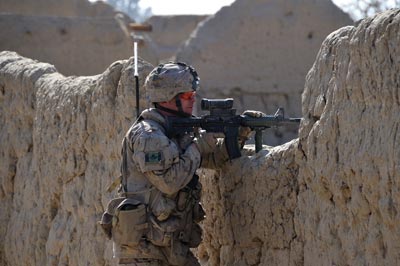
DND photo AR2011-0025-088 by Corporal Tina Gillies.
A soldier from Task Force Kandahar provides security while on a foot patrol
IE is, therefore, the ethical accountability which the chain of command and the senior leaders who are part of it have toward their subordinates in the execution of their daily tasks. Consequently, the ethical behaviour of those authorities must be reviewed when their subordinates conduct themselves in unacceptable and illegal ways that tarnish the image of the profession of arms.19 That ethical responsibility requires, among other things, that sufficient resources be devoted to preparing the troops properly before deployment, particularly for unusual tasks being performed in unconventional environments. Ethical duty - certain aspects of which, I acknowledge, overlap with the operational responsibilities of the chain of command - is not unlimited, but it must include ensuring adequate training and appropriate equipment for those tasks, as well as appropriate follow-up throughout the period when the tasks are actually being carried out. It is important to recognize that military personnel working in a unit where Canadian operating methods are completely unknown have very different needs than do personnel serving in a Canadian formation.
In addition, the individual ethics of those authorities20 should oblige them to assess themselves during unusual circumstances and incidents. And, depending upon the circumstances, their ethics should prompt them to acknowledge that certain ethical errors committed by subordinates are connected to institutional shortcomings, or to specific operational needs. Those authorities should then make a commitment to reconsider the level of accountability to which members who have committed wrongful acts should be held, and to correct the institutional shortcomings, when it is in their power to do so.21 Let us remember that CF members are called upon to operate in wartime conditions, where managing chaos is a daily task they must perform while complying with international conventions and Canadian laws, which cannot predict the nature of all situations that will be encountered, or provide a suitable framework for determining what conduct is appropriate for achieving a given operation’s objectives.22 No doubt, an understanding of those facts influences international criminal courts, and the International Criminal Court itself, which usually attributes some degree of accountability (which varies depending upon the circumstances) to the highest-ranking officers when it is proven that war crimes were perpetrated by their subordinates. However, that is not the case in question here.
I realize that the concept of IE is absent from Department of National Defence (DND) publications, and that its relevance could be questioned. My objective is, above all, to send a message to senior leaders that the military institution has an ethical responsibility for the way it uses its human resources, especially when its members are called upon to work in unfamiliar environments. I also recognize that the concept must go hand-in-hand with transparent, loyal conduct by military leaders, who are legally subordinate to the political authorities. It is this last aspect of the senior leaders’ duty that I have a problem with, since it must be reconciled with respect for the dignity of all people. We must not forget that that particular principle is the first one listed in DND’s “Statement of Defence Ethics.”
How, then, do we reconcile this principle with the secret nature of some of the CF’s operational entities, and the institutional culture of the supremacy of the mission, which is impressed upon every CF member, commencing upon his or her first day in uniform? Add to that the complexity of contemporary military operations, the fact that such operations may be both joint and/or combined, and that the unconventional nature of the missions may involve the use of force. It seems obvious to me that these contradictory demands placed upon the chain of command may lead it to make decisions that have predictable consequences, both good and bad, and that expose the people executing the decisions to dilemmas,23 and the consequences of those dilemmas, as part of their day-to-day work. We need only think of the effects of post-traumatic stress syndrome (PTSD) on many CF members who have served in recent combat operations to realize the significant impact of these operational environments.
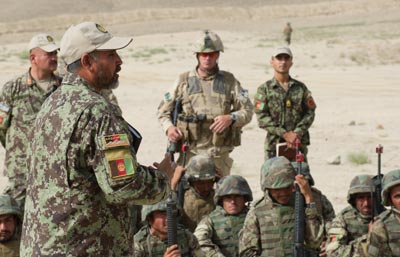
DND photo AT2011-0039-01a by Master Corporal Rory Wilson.
Afghan soldiers during a counter-ambush exercise at the Consolidated Fielding Centre in Kabul. Looking on is a soldier of the Canadian Contribution Training Mission – Afghanistan
We should also remember that the CF is one of the rare Canadian institutions in which interpersonal relations are based upon the notion of a family, which, notably, entails respect for and the well-being of all its members.24 However, in response to the internal context and the international situation in recent decades, major changes have been made to the quality of the services provided to CF members and their families in order to maintain that privileged connection.25 This special relationship also serves as a basis for the unshakeable trust in the chain of command26 that must be established and maintained to ensure unconditional loyalty, in particular, during combat operations, since it is well known that that relationship is closer within combat units. Clearly, any ethical shortcomings on the part of the higher authorities can have a serious impact upon that privileged relationship.
That being said, if one wishes to pass ethical judgment upon professional acts committed by members of the military, we cannot do so without considering what training IE provided, and what example it set for those troops, as well as the nature of the tasks assigned to those troops. The situation we are considering involves a subordinate officer serving as a mentor to a foreign force. The Afghan National Army (ANA) differs from the CF in its method of operation, as well as with respect to its languages and culture. At the time, its code of conduct no doubt reflected tribal and religious practices more than international conventions, at least, at the level at which Captain Semrau was operating.
We should therefore add to Professor Bradley’s ethical analysis an assessment of the preparation Captain Semrau underwent before his deployment. We must also ask whether the captain received proper supervision throughout his assignment in Afghanistan, and whether his superiors were informed of any ANA unethical practices. In addition, we need to know whether he had already reported such acts before the October incident, and, if so, how the chain of command reacted. Were Captain Semrau and the members of his team really properly prepared to work in that type of environment? When they took on the role of mentoring Afghan troops, did Canadian authorities realize the risks to which they would be exposing their military personnel from an ethical point of view? And what steps did they take to keep those risks to a minimum?
Obviously, the answers to those questions could change the way we view the events of 19 October 2008. If we were to discover inadequacies in the training and supervision provided to Captain Semrau, that could shed a different light upon his degree of responsibility and the ethical nature of his actions.
My 1993 stint in Bosnia with the European Community exposed me to situations in which I could count only on myself, in an unknown environment for which my military experience had not really prepared me. Nevertheless, I always felt that I was fully responsible for my actions. But even though the person who commits an action is always responsible for that action, the chain of command must accept part of that responsibility if it is proven to have failed, deliberately or not, to do its duty. Certainly, extreme situations sometimes require rapid responses, which, even if anticipated, might well create ethical dilemmas that our military personnel are not always equipped to face.
This shared responsibility is nothing new: it has always existed and it was institutionalized on the international scene during the Nuremberg trials, when Nazi leaders, including Field Marshal Wilhelm Keitel, were convicted of war crimes and crimes against humanity because they incited their subordinates to commit atrocities. Depending upon the nature of those atrocities, I doubt that all the people who committed them with the approval of the Nazi regime were judged by the German courts as being equally guilty.
Consequently, it seems entirely appropriate, from the point of view of ethics, that we take another look at the accountability of higher authorities, especially in situations where the conduct of military personnel has led to legal and criminal prosecution. The ethical nature of a given mission to be carried out must be assessed, and it must be ensured that the military members involved receive the required training and supervision so that they can perform their duties ethically.
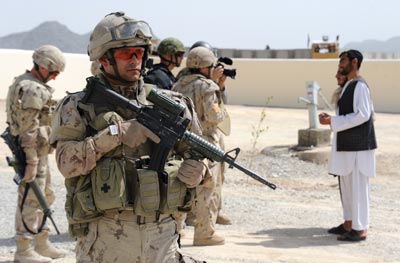
DND photo IS2011-1027-04.
Canadian soldiers and Afghan civilians
Conclusion
My objective has not been to absolve Captain Semrau, who will always be responsible for his actions, but rather to show that the ethical importance of his actions was not limited to the setting in which he committed them. Firstly, the nature and the complexity of modern warfare, subject to our society’s requirements in terms of respect for human life and human rights, will pose more and more harm dilemmas for the individuals fighting those wars. Even adherence to legal and legitimate interventions governed by international law will necessarily cause its share of harm and injury. Operations in unconventional environments will also occasion their share of inquiries into the legality of the intervention protocols, and on the corresponding actions. We need only think of the ongoing political saga concerning accusations of mistreatment of Afghan prisoners and violations of international conventions by the Canadian authorities from 2006 to 2008, with its continuing new developments, to realize the changes that have occurred in combat environments, and the ethical importance of those changes.
If the attitude that British Army Brigadier Shelford Bidwell espouses with respect to “… not wanting to hurt your enemy too much” is correct, then all the wars we fight in the future will have an ambiguity. We will have to abide by the laws of war that our society accepts, but we will want to – indeed, we will still have to - destroy the opposition’s capability to fight, and to impose our will upon them.27
This potential ambiguity calls for thoughtful reflection upon what I have termed institutional ethics. IE involves, on one hand, providing troops with adequate preparation and follow-up, and, on the other hand, recognizing the ethical responsibility of the CF’s senior leaders, and certainly the political leaders, who place the troops in situations in which their actions will have ethical importance and may cause harm. The authorities must therefore acknowledge the ethical risks to which they are exposing their subordinates, and assume their share of responsibility for the acts committed by those subordinates. By doing so, they will position themselves to maintain the privileged relationship they currently have with all their subordinates, and prevent that relationship from deteriorating.
Lastly, although I am not questioning the Canadian military’s hierarchy of ethical principles, I believe that deliberately placing military personnel in situations where they will have to commit actions that may cause harm shows a lack of respect for their dignity, even if it is being done in order to achieve a higher objective, such as safeguarding national interests.
Lieutenant-Colonel Rémi Landry, OMM, CD, Ph D, is currently an associate professor at the Université de Sherbrooke, an instructor at McGill University, and a military analyst for Réseau de l’information de Radio-Canada (RDI, a French-language news network). He contributed on several occasions to the work of the International Criminal Tribunal for the Former Yugoslavia (ICTY, as a witness for the prosecution, and an expert witness and a consultant for the defence. His areas of research are international security issues, foreign affairs in Canada, and the Department of National Defence.
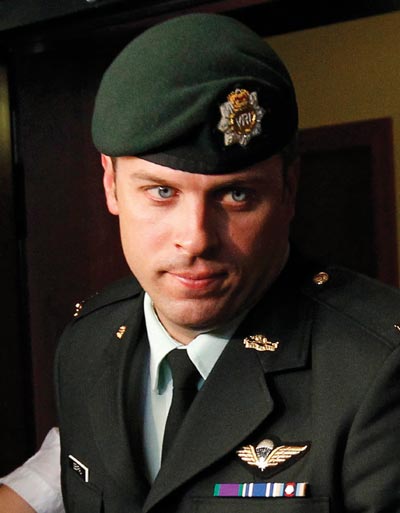
Reuters RTR2GJQQ by Chris Wattie.
Captain Semrau leaves his military tribunal, 19 July 2010.
NOTES
-
See Canada, Department of National Defence, Code of Conduct for CF Personnel, B-GG-005-027/AF-023, at www.cda-acd.forces.gc.ca/cfmlc-cdmfc/doc/CFCC-CCFC-eng.pdf.. Ethics in the Canadian Forces: Making Tough Choices, published under the auspices of the Chief of Defence Staff by the Canadian Defence Academy, and the Canadian Forces Leadership Institute, 2006; Duty with Honour: The Profession of Arms in Canada, 2004, p. 82, http://www.cda.forces.gc.ca/cfli-ilfc/doc/dwh-eng.pdf; Statement of Defence Ethics, Defence Ethics Programme, modified 3 March 2011, http://www.dep-ped.forces.gc.ca/dep-ped/about-ausujet/stmt-enc-eng.aspx; and Duty with Discernment: CLS Guidance on Ethics in Operations, Strategic Edition, 2009, http://www.army.forces.gc.ca/land-terre/aep-peat/downloads-telechargements/duty-servrir/duty-servrir-eng.pdf; all accessed in June 2011.
-
Louis Pojman reminds us that, although moral principles have universal value and objectivity, moral rules are not absolute, and the majority of them can thus be cancelled out by others in certain situations. Louis P. Pojman, Ethics: Discovering Right & Wrong, 4th Edition, Wadsworth Canada, Thomson Learning, 2002, pp. 18–19. Malham Wakin discusses this in terms of universal obligations, rather than absolute principles. He describes these obligations as being not absolute, not always observable, and occasionally incompatible. However, they are not arbitrary, subjective, or subject to cultural relativity. They concern all human beings, but do not apply to all possible circumstances. “Our rule of action is that we are justified in violating our universal moral obligations only when they conflict with a higher obligation and we cannot fulfill both at once.” Malham M. Wakin, “The Ethic of Leadership I,” in War, Morality, and the Military Profession, 2nd Edition., Malham M. Wakin (ed.), (Boulder, CO: Westview Press, 1986), pp. 195–196.
-
“[A] situation in which any possible solution will cause harm or injury to others. This type of dilemma is often described as a ‘lose-lose situation.’” Ethics in the Canadian Forces: Making Tough Choices (Instructor Manual), Canadian Defence Academy and Canadian Forces Leadership Institute, 2006, p. 13.
-
Some of Canada’s allies have ethical codes similar to that of the Canadian Forces, but although respect for the dignity of all persons is present in their list of ethical principles, it does not appear to occupy first place, as it does in the CF. Lieutenant-Colonel Jeff Stouffer and Stefan Seiler, PhD, (eds.), Military Ethics: International Perspectives, (Kingston, ON: Canadian Defence Academy Press, 2010).
-
“ ‘I must meet rules, the mandate, the political guidance,’ but, he adds, and grows quietly pensive, ‘I look at every target … at the end of the day it’s a judgment call … and I’m accountable, I’m accountable to Canada, I’m accountable to NATO, and more importantly I’m accountable to myself,’ he says. Make the wrong call and the wrong people, or maybe too many people, die. And, General Bouchard adds: ‘I want those who know me best to be able to look at me and say, “You did the right thing.” ’ ” Paul Koring, Joint Forces Command, Naples, Italy. “Canadian directing war in Libya calls it ‘… a knife-fight in a phone booth’,” Globe and Mail. http://www.theglobeandmail.com/news/politics/canadian-directing-war-in-libya-calls-it-a-knife-fight-in-a-phone-booth/article2057706/page1/. Accessed on 13 June 2011.
-
“... Brigadier-General Ahmed Habibi says [the commander of the Afghan troops who fought beside Canadian troops] ... Canadian army mentors went to great lengths to teach Afghanistan’s ‘new army’ to respect human rights, the general said. ‘It is from the Canadians that we learned how to treat prisoners of war,’ he said. ‘All of our foot soldiers now know this. The Canadians taught us how to behave according to democratic principles.’” Matthew Fisher, Afghan commander credits Canada with weakening Taliban, Postmedia News, 13 June 2011. http://www.globalnews.ca/world/
Afghan+commander+credits+Canada+with+weakening+Taliban/4939059/story.html. Accessed on 13 June 2011. -
This doctrine states that it is always morally wrong to intentionally commit a harmful act with the aim of bringing about positive consequences, but that, on occasion, it is acceptable to commit an act that will have some negative consequences. To be acceptable, the act committed must meet four criteria: it must be morally good or neutral; its negative effects must not be the means used to obtain the positive consequences; its harmful effects - even if predictable - must be involuntary; and its positive consequences must be at least equivalent to, or superior to, its negative consequences. Louis P. Pojman, pp. 45–49.
-
Captain Semrau arrived in Afghanistan in August 2008, and the incident occurred in October 2008. Captain Robert Semrau: One of Canada’s finest dismissed from the military, Assoluta Tranquillita, Monday, 21 February 2010, http://assolutatranquillita.blogspot.com/2011/02/captain-robert-semrau-one-of-canadas.html. Accessed on 21 February 2011.
-
Providing care to an injured combatant is a cultivated reflex that becomes natural to our soldiers, and it is difficult to understand how experienced soldiers, such as Warrant Officer Longaphie, a member of the mentoring team, did not react by coming to the man’s aid, even if we assume that it was not the first time the team had found itself in a similar situation. Considering the pre-deployment training period and the selection process undergone by all members of the team, other possibilities, such as a flagrant lack of professionalism, sheer incompetence, or inadequate preparation for the mission were probably not contributing factors.
-
“Perron [Lieutenant-Colonel Jean-Guy Perron, military judge] took 65 minutes to lay out his reasons for the sentence. He described Semrau as an exemplary officer, whose men testified to his courage and leadership. He said the shooting was clearly out of character. But, he said, none of this mitigated the gravity of the offence.” John Ward, “Judge dismisses Semrau from military for Afghan battlefield shooting,” The Canadian Press, Gatineau, 5 October 2010, http://www.reddeeradvocate.com/breaking_news/Judge_dismisses_Semrau_from_military_for_Afghan_battlefield_shooting_104354344.html?period=W&. Accessed on 2 June 2011.
-
“You personally failed to abide by one of our most important principles: that of using force only in accordance with lawful orders. You might have been torn between your personal moral values and your duties as a Canadian soldier.” Ibid.
-
The information we have indicates that it would have been possible to ask the British forces to perform a medical evacuation. However, doing so would have caused a delay and would no doubt have had consequences for the continuation of the operation.
-
“A U.S. Apache helicopter was called in and fired several bursts from its 30-mm automatic cannon. This gun can fire more than 600 rounds a minute. Some time later, on a narrow dirt track at the edge of a cornfield, Longaphie and Haraszta came upon a badly wounded Taliban fighter surrounded by Afghan soldiers. The insurgent had been shot from a tree by the attack helicopter; he had life-threatening wounds to his abdomen and legs.” Andrew Duffy, “A tale of four soldiers: the day that led to Robert Semrau’s court martial,” Ottawa Citizen, 18 July 2010, http://assolutatranquillita.blogspot.com/2011/02/captain-robert-semrau-one-of-canadas.html. Accessed on 2 June 2011. “But those heroics don’t justify shooting a weaponless enemy fighter who had been nearly cut in half by helicopter fire, the former top Canadian commander in Kandahar testified.” Steve Rennie, “Soldier says Semrau saved his life in Afghanistan,” The Canadian Press, Gatineau, published 26 July 2010, http://www.680news.com/news/national/article/81810--soldier-says-semrau-saved-his-life-in-afghanistan. Accessed on 2 June 2011.
-
Select Committee on Dying with Dignity, created through a motion carried by Quebec’s National Assembly on 4 December 2009, Government of Quebec, http://www.assnat.qc.ca/en/travaux-parlementaires/commissions/csmd-39-1/index.html. Accessed in May 2011.
-
Duty with Discernment: CLS Guidance on Ethics in Operations, Strategic Edition, 2009, para 3, p. 9.
-
The Canadian Forces ethos is the centre of gravity of the military profession. It provides an ethical framework for professional handling of military operations while serving as the basis for the legitimacy, the effectiveness, and the honour of the Canadian Forces. We must also recognize that the military institution is represented and led by its chain of command, which is made up primarily of senior officers, and that the impetus for putting our concept of institutional ethics into practice comes almost exclusively from the leadership of those senior officers. In addition, ethics must be actualized within the context of military rules and Canadian laws.
-
The inquiry into the deployment of the Canadian Forces in Somalia and its consequences illustrates this very well.
-
“Because the military function is so directly related to our highest human values, those charged with the leadership of that function must be sensitive to those values and must exhibit some understanding of them.” Wakin, p. 196.
-
Major-General Penney makes clear the need for general officers to self-regulate, and the devastating impact that a lack of ethics on their part has on the morale and effectiveness of the entire military community. Major-General K.G. Penney, “A Matter of Trust: Ethics and Self-Regulation Among Canadian Generals,” in Generalship and the Art of the Admiral: Perspectives on Canadian Senior Military Leadership, Bernd Horn and Stephen J. Harris (eds.),(St. Catharines, ON: Vanwell Publishing Limited, 2001), p. 165.
-
“The British Army officer Brigadier Shelford Bidwell suggests in his writing that ethics and professional requirements frequently clash. His remark that ‘… no general ever won a war whose conscience troubled him or who did not want to beat his enemy too much’ points to the fact that some senior ranks in the profession of arms could have a significant psychological problem in trying to perform the tasks that they are required to undertake.” Norman F. Dixon, On the Psychology of Military Incompetence, (London: Pimlico, 1976), p. 15, quoted in Ian MacFarling, Ethics and the Profession of Arms, conference report, Aerospace Centre 2000 Air Power Conference, Air Power and Joint Forces, Commonwealth of Australia, 1995.
-
It was no doubt for those reasons that the Chief of the Land Staff published (in 2009) Duty with Discernment: CLS Guidance on Ethics in Operations. This work deals with, among other things, the nature of asymmetrical warfare, and its combatants.
-
“Members of the profession must ensure the care and well-being of subordinates,” Duty with Honour, p. 13.
-
Since 2007, support provided to CF members and their families has been reviewed, in view of their new needs and the impact of recent operations. For example, see the news story at http://www.canada.com/news/Somnia/4308202/story.html and the Personnel and Family Support Services website at http://www.aspfc.ca/en/index.asp. In addition, Veterans Affairs Canada has updated its services to take today’s realities into account, and it continues to improve the services it offers to veterans from the 1990s.




